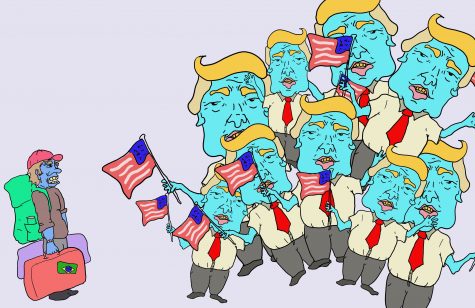Trump’s policies hurt international students
January 26, 2017
After the election of Donald Trump as the president of the United States, many international students have started to worry about their future in this country and whether they are welcome here any longer. To many students like myself, Trump’s election was a huge surprise because we came to the U.S. believing it to be welcoming and accepting to foreigners. Even college websites advertise the importance of diversity and always trying to bring more international students to campus.

Unfortunately, according some statistics by Intead, during the past two months uncertainty has risen among international students in the country. Among this group, 60 percent don’t know whether they are coming back next year or will be ‘allowed’ to do so. The worries are even bigger for Muslim students who come from one of the many ethnic backgrounds Trump attacked during his campaign. I have seen this fear among friends of mine from my previous school who come from the Middle East and have struggled to make it to the United States to get a better education and improve their careers. Now, they are faced with the dilemma of what will happen to them and whether they can come back for the next academic year.
Since there is the possibility that the new government might restrict immigration from Muslim countries (as Trump himself promised during his campaign), this could mean that students from these countries would consequentially have a harder time getting a student VISA. Trump’s anti-Muslim rhetoric could make the job of the international offices in many colleges who aim to recruit more students from different parts of the world more difficult as well. This is due not only to the high possibility of new immigration restriction rules, but also to the fear of high school seniors around the world who would be discouraged to apply.
In the long run, this could be very harmful to the U.S. because many of the current international students studying here graduate in STEM majors of high economic demand. Many of them go on to work for important research universities such as MIT or even NASA. Many other companies rely on foreign nationals who have majored in ‘high-valued’ fields, who sometimes outshine U.S. students, and those companies would be seriously damaged by more immigration restrictions.
The status of being a foreign student won’t likely be changed, but the new Trump administration could have a fundamental say on what could happen to these students once they graduate. Prior to being elected, Trump stated that he would eliminate the OPT (Optional Practical Training) that allows foreign students to work in U.S. for a period of 12 months in total, as well as restrict the HB1 VISA, which serves as a work permit for a certain number of years.
Even if these changes don’t happen, there is still the problem of whether there are any job opportunities for international students who would like to work here once they graduate. Many fear they won’t be able to, especially the ones that are not majoring in ‘high-demand’ fields. There is the unfortunate chance that there might be more hostility towards internationals by employers, who would rather give the job to one of ‘their own.’





